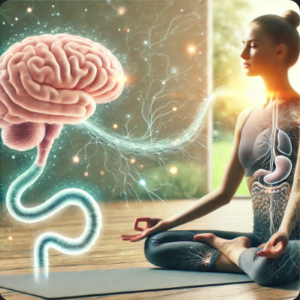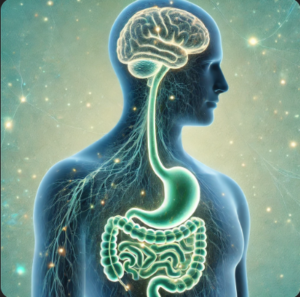In recent years, the term “gut-brain connection” has gained significant attention, particularly in the fields of wellness and holisticA healing approach that looks at the whole person and not just their physical symptoms, in order to eradicate illness and produce well-being in the mind, body, and soul. health. This connection refers to the complex communication network that exists between your digestive system and your brain. Interestingly, this relationship is bidirectional, meaning that your gut can influence your brain, and vice versa. This dynamic interaction is not only crucial for maintaining physical health but also plays a pivotal role in emotional and mental well-being.
One effective way to nurture this connection is through yoga. By combining physical postures, breathing exercises, and mindfulness, yoga can be a powerful tool for enhancing digestive wellness. In this post, we will explore the science behind the gut-brain connection and delve into how yoga promotes better digestion and overall health.
What Is the Gut-Brain Connection?
The gut-brain connection is a complex system of communication that involves the central nervous system (CNS), the enteric nervous system (ENS), and the gut microbiome. Here’s a brief overview of each component:
- Central Nervous System (CNS): Comprising the brain and spinal cord, the CNS is responsible for processing and sending information throughout the body. It plays a major role in managing stress responses, which can directly impact digestion.
- Enteric Nervous System (ENS): Often referred to as the “second brain,” the ENS is a vast network of neurons lining the gastrointestinal tract. It controls digestion independently of the CNS, but it communicates closely with the brain through the vagus nerve.
- Gut Microbiome: This refers to the trillions of microorganisms living in your digestive tract. These microbes play a crucial role in digestion, immune function, and even mental health. An imbalance in the gut microbiome can contribute to digestive disorders and impact mood and cognition.
The gut and brain communicate through various pathways, including:
- Vagus Nerve: This nerve acts as a superhighway, sending signals between the gut and the brain.
- Hormones and Neurotransmitters: The gut produces several hormones and neurotransmitters, such as serotonin, which influence mood and digestion.
- Immune System: Gut health can influence the immune system, which in turn affects brain function.
How Stress Disrupts the Gut-Brain Connection
Stress is one of the primary disruptors of the gut-brain connection. When you experience stress, the body triggers a “fight or flight” response, releasing stress hormones like cortisol. While this response is essential for survival, chronic stress can lead to a host of digestive issues, including:
- Irritable Bowel Syndrome (IBS): Stress is a well-known trigger for IBS, a condition characterized by abdominal pain, bloating, and altered bowel habits.
- Leaky Gut Syndrome: Chronic stress can damage the lining of the gut, leading to increased intestinal permeability, which allows toxins and bacteria to enter the bloodstream.
- Inflammation: Stress can lead to chronic inflammation, which can negatively affect both the gut and the brain.

How Yoga Supports the Gut-Brain Connection
Yoga offers a holistic approach to strengthening the gut-brain connection. By incorporating physical postures, breathwork, and mindfulness, yoga can help alleviate stress, improve gut health, and enhance overall well-being.
- Physical Postures (Asanas):
- Twisting Poses: Poses like Ardha Matsyendrasana (Half Lord of the Fishes Pose) and Parivrtta Utkatasana (Revolved Chair Pose) gently compress and massage the abdominal organs, stimulating digestion and promoting detoxification.
- Forward Bends: Paschimottanasana (Seated Forward Bend) and Uttanasana (Standing Forward Bend) can help relieve bloating and encourage the downward flow of energy, aiding in the elimination process.
- Gentle Inversions: Poses such as Viparita Karani (Legs-Up-the-Wall Pose) improve circulation to the digestive organs and reduce stress by calming the nervous system.
- Breathwork (Pranayama):
- Deep Belly Breathing: This simple yet effective practice helps stimulate the vagus nerve, promoting relaxation and improved digestive function.
- Nadi Shodhana (Alternate Nostril Breathing): Balances the nervous system and reduces stress, which can have a positive impact on digestion.
- Kapalabhati (Skull Shining Breath): This more vigorous breathing technique stimulates the digestive fire, or “Agni,” enhancing metabolism and detoxification.
- Mindfulness and Meditation:
- Mindful Movement: Practicing yoga with mindfulness helps cultivate a deep awareness of the body, promoting a stronger mind-body connection and reducing the effects of stress on the digestive system.
- Meditation: Regular meditation can lower stress levels, which in turn supports a healthy gut-brain connection. Mindfulness meditation, in particular, encourages a calm mind and can improve digestion by reducing the physiological effects of stress.
 Scientific Evidence Supporting Yoga’s Benefits for Digestion
Scientific Evidence Supporting Yoga’s Benefits for Digestion
Research has shown that yoga can be particularly beneficial for those with digestive disorders. For example:
- Irritable Bowel Syndrome (IBS): Studies have found that regular yoga practice can reduce the severity of IBS symptoms, likely due to its stress-reducing effects.
- Inflammatory Bowel Disease (IBD): Yoga has been shown to improve the quality of life in individuals with IBD by reducing inflammation and promoting relaxation.
- General Digestive Health: Yoga has been associated with improved gastrointestinal function, including better digestion, reduced bloating, and regular bowel movements.
Conclusion
The gut-brain connection is a vital component of overall health, and maintaining this connection is crucial for both physical and mental well-being. Yoga offers a powerful, holistic approach to nurturing this relationship, helping to reduce stress, enhance digestion, and promote a healthier, more balanced life. By incorporating yoga into your daily routine, you can take meaningful steps toward improving your digestive wellness and strengthening the gut-brain connection.






